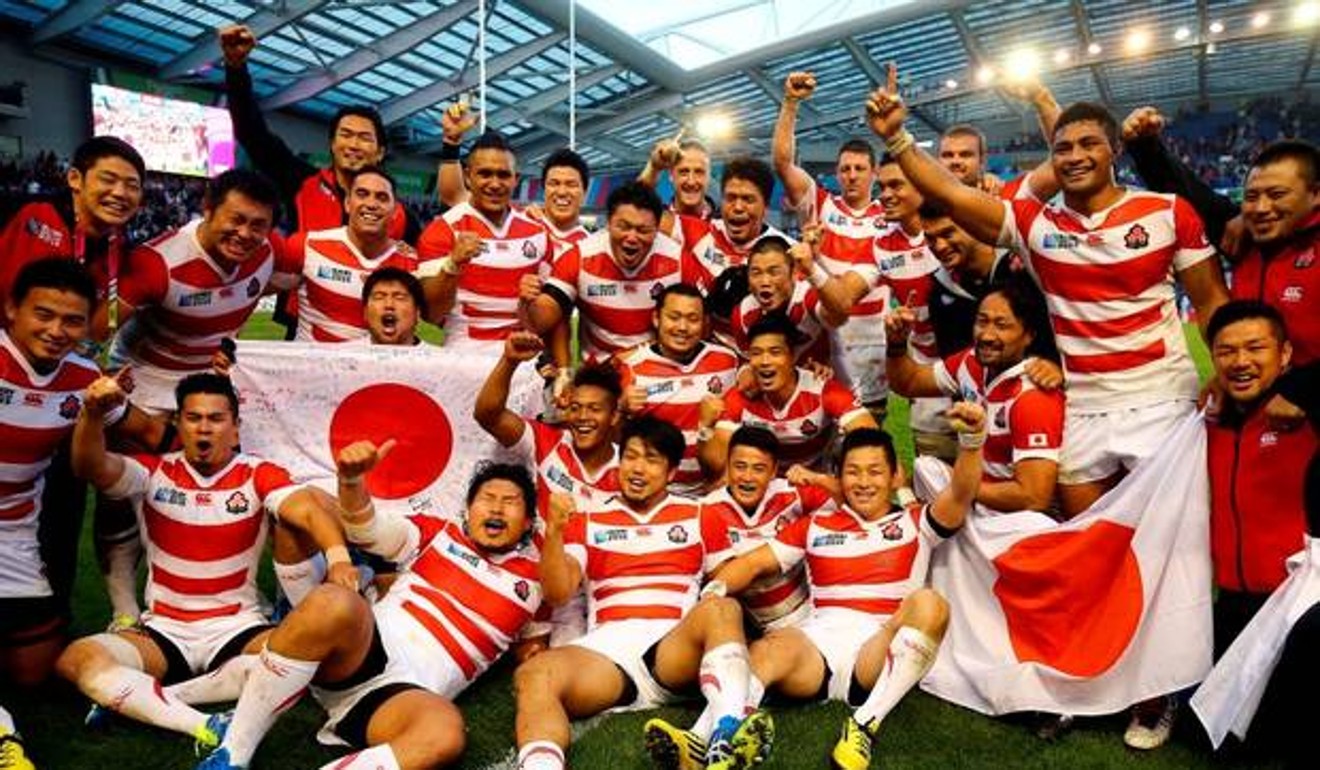
Eddie Jones’ star burns brightest at Rugby World Cup as the man who put Japan on the world map seeks glory with England
- The local media cannot get enough of the well-travelled Australian who is of Japanese heritage
- Jones’ American-Japanese mother was sent to an internment camp in the US after Pearl Harbour
Cutaway mode is the ultimate act of respect in Japan saved only for the most venerated, like baseball god Ichiro Suzuki. Regardless of the situation, in between every single pitch the cameras would cutaway to Ichiro because the Japanese love to suffocate the celebrated. Well, congratulations England coach Eddie Jones because you are now in full cutaway mode in Japan.
Here’s Eddie looking happy, here’s Eddie looking serious. There’s Eddie more serious and there’s Eddie happier. Everywhere, anywhere – its Eddie. Thirty minutes before England plays the US in Kobe, the lead in to the broadcast on the Japanese channel is a half-hour show on Jones with a comely presenter bringing up a graphics board that touches on his particulars.
His Japanese-American mother met his father, an Australian soldier on occupation duty in Japan after the war, in Hiroshima. They would marry, move back to Australia where their son Eddie would develop a love for rugby. Short in stature but voracious in desire, his passion could only take him so far as a player.
He became the ultimate coaching nomad working for a few Japanese clubs in the mid-90s before returning home and eventually being named Australian national coach just in time for the country’s hosting of the 2003 Rugby World Cup. A youthful Jones would take the Wallabies to the final before losing to England but four years later he would lift the Webb Ellis cup as an assistant with South Africa. Eight years later he engineered the greatest upset in the history of rugby when he led Japan to a 34-32 win over those same powerful Springboks at the 2015 Rugby World Cup in what is now referred to as the “Brighton Miracle”.

A couple of months after the miracle England would come calling. Actually begging is more like it after suffering the ignominy of being the first host side at a World Cup to be eliminated in the group stage of the tournament. Jones would overhaul things and all of it with an eye on Japan 2019. Now here he is, everywhere.
There are, however, a few things that do not appear on the presenters’ graphic board. Born and raised in California, as a 16-year-old Jones mother Nellie and her family were sent to separate internment camps when Pearl Harbour was bombed in late 1941. After the war, her embittered father took the family back to Japan, to Hiroshima of all places, where she was less than loved by the locals who knew she was an American.
Relief for the newlyweds would not come until almost 10 years later when Japanese women were finally allowed to legally enter Australia with their husbands. It was hardly the warmest of welcomes for Nellie but at this stage she had developed a harden stoicism that would influence her son to this day. A stern taskmaster who suffers fools poorly, Jones credits his mother for developing that hardness in him.

He also credits his wife for keeping him in check, particularly when he took his first coaching job in Japan back in the mid-90s. “She is pretty clued up,” he told The Sydney Morning Herald. “She said, ‘Just remember you will never be accepted as a Japanese, so do not ever think you will be.’ That really stayed with me, so I never cared whether I was liked or not. All I was looking for was respect.”
Today, Nellie’s son Eddie-san is the cat daddy in Japan and if the English should prevail and win the World Cup, he will no doubt be Sir Eddie, one of the rare Australian knights.
After England opened with two resounding victories over a four-day span against Tonga and the US, Jones exhaled and revealed his mischievous side at the post-match press conference. When asked how English fly-half Owen Farrell was after a brutal high hit, Jones replied: “I think they’re about to barbecue part of his nose, I think someone’s found it on the field. No, he is missing part of his nose which is unfortunate. But he’s married and got a young child so he won’t be looking for any young lass in Kobe tonight so he’ll be OK.”

Jones seemed to revel in watching the Japanese media scramble to come up with a suitable translation. He is playing to two distinct constituencies on this trip, one the old-school English rugby media and the other the insatiable and parochial Japanese press. He seems to be enjoying the unlikely, and somewhat entertaining, confluence of the two and well he should.
Eddie Jones is a coaching nomad and a cross-cultural phenom whose legacy is secure, even if his greatest professional success may still lie in front of him.

